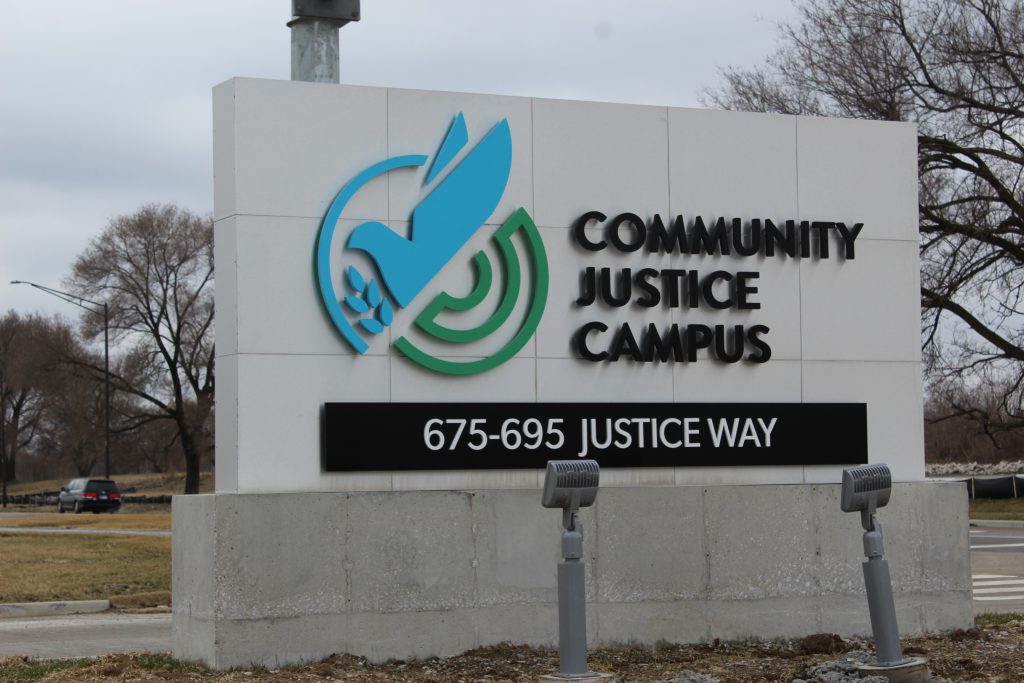Subscriber Benefit
As a subscriber you can listen to articles at work, in the car, or while you work out. Subscribe NowThe Indianapolis Bar Association is defending a local judge against “inaccurate” and “reckless” comments made by Indiana State Police Superintendent Doug Carter, who criticized the judge for setting bond for a defendant accused of killing three in a high-speed car crash.
IndyBar released the statement Wednesday defending Marion Superior Judge Jennifer Harrison and hitting back at Carter, whom the bar described as an “unaccountable individual.”

In an interview with Fox 59/CBS 4 last week, Carter criticized Harrison by name for setting a $1,000 cash bond and a $50,000 surety bond for Luis Leyba-Gonzalez, who is facing three counts of Level 3 felony resisting law enforcement resulting in death.
“The clear inference from Superintendent Carter’s statements to the public were that, but for Judge Harrison, Mr. Luis Leyba-Gonzalez should not have been released from the Marion County Jail,” the statement — which notes that no judicial members of the bar participated in its drafting — says. “Unfortunately, those statements are factually incorrect, and the resulting inferences are dangerous.”
According to WRTV, Leyba-Gonzalez, 19, is accused of causing the deaths of 21-year-old Makayla Hankins, who was in another vehicle, and 14-year-old Christian Leyba-Gonzalez and 32-year-old Jose Gonzalez Jr., his brother and cousin, respectively, who were passengers in his car.
Leyba-Gonzalez was “joyriding” in a Dodge Challenger on Sept. 26 at speeds of up to 140 mph when police began a pursuit that they eventually called off for safety reasons, WRTV reported. Leyba-Gonzalez then ran a red light, causing the fatal crash.
Harrison set bond Sept. 28, denying the state’s “Motion for Greater than Standard Bond.” An initial hearing was held Monday, when a not-guilty plea was entered on his behalf. A jury trial has been scheduled for January, and Leyba-Gonzalez is out on bond.

Meanwhile on Friday, Carter took aim at Harrison for the bond decision, and at the court system as a whole, telling Fox 59/CBS 4, “When is enough enough? At what point are we going to say stop? Shake up the Etch a Sketch. We’ve got to clear the slate. This isn’t working. This level of accountability is not working.”
Specifically criticizing the setting of bond, Carter said Harrison essentially placed the value of Hankins’ life at $330 dollars, or one-third of the $1,000 bond. He also said he tried to call Harrison, but she did not take the call.
Defending the judge’s actions, IndyBar pointed to the state and federal constitutions as well as the Code of Judicial Conduct.
“Pursuant to both the United States and Indiana Constitutions, criminal defendants are afforded a presumption of innocence through each phase of the criminal process. This includes the phase of setting bail,” the statement says. “As such, in determining a bail amount, Indiana law requires that a judicial officer impose conditions that will assure the appearance of the accused for future court hearings along with ensuring no further safety threat to the community. An evaluation of the probable cause affidavit, the defendant’s criminal history, and all other appropriate circumstances supports that the bond issued by Judge Harrison in the amount of $50,000 surety plus $1,000 cash was appropriate.
“There are limited circumstances where an accused can be denied bail from the outset of an arrest,” the statement continues. “Those circumstances do not apply to this case. Thus, had Judge Harrison denied Mr. Leyba-Gonzalez bail at all, as suggested by Superintendent Carter, she would have been violating both the law and his constitutional rights.”
Currently, the Indiana Constitution provides that bail can only be denied in cases alleging murder or treason, although there are efforts underway to amend the Constitution to allow the denial of bail if “the proof is evident or the presumption strong,” and if “the state proves by clear and convincing evidence that no release conditions will reasonably protect the safety of any other person or the community.”
As for Carter’s claim that Harrison refused to take his call, the IndyBar statement says “Superintendent Carter should certainly know that judges cannot have ex-parte communications (one sided conversations) with the Superintendent of Indiana State Police in a criminal case where his officers are witnesses in that case or where he personally might be a witness. Section 2.9 of the Indiana Code of Judicial Conduct prohibits such ex-parte communication.
“If judges were to take calls from parties or witnesses in cases pending in their court, then they would violate their sworn oaths of neutrality and impartiality,” the statement continues. “The public should have a clear understanding of how our judges are required to act in cases.
“Just think how it would be if everyone in a case could first pick up the phone and call the judge to directly influence them about the case. Our system of judicial conduct prevents this from happening and the impartiality of our judges is a fundamental part of our justice system.”
While encouraging “constructive criticism among members of the community regarding the judicial system,” IndyBar also noted “that our judges have an obligation to refrain from participating in that discourse when doing so might undermine and jeopardize the rights of individual litigants.”
“Indiana judges are required by the Indiana Code of Judicial Conduct Rule 1.2 to ‘act at all times in a manner that promotes public confidence in the independence, integrity, and impartiality of the judiciary, and shall avoid impropriety and the appearance of impropriety,’” the statement says. “Judges and their court staff are prohibited from making any public statements that ‘might reasonably be expected to affect the outcome or impair the fairness of a matter pending or impending in any court or, make any nonpublic statement that might substantially interfere with a fair trial or hearing.’
“Given our judiciary’s inability to meaningfully respond to Superintendent Carter’s proclamations, and pursuant to Section 2.10 of the Code of Judicial Conduct, IndyBar has an obligation to do so,” the statement continues. “Public safety, and justice, is paramount to our members and the larger community.
“Unlike Superintendent Carter, we are bound by ethical rules that prohibit us from offering false narratives in the public sphere. Constructive and accurate criticism is a fundamental component to ensuring that our judicial process works effectively for all in our community. At IndyBar, we provide a positive forum for respectful discourse and education regarding the judicial process, but in instances where an unaccountable individual makes damaging claims that are demonstrably false, we have a collective duty to attempt to correct the record. Doing so is fundamentally important as we work together to ensure that justice is done in a fair and consistent manner in the Indianapolis community.”
Harrison has been a judge since 2019. She was among the first group of judges that Indiana Gov. Eric Holcomb appointed to the bench in 2018 following the county’s move from elections to merit-based selection for the Superior Courts.
Prior to taking the bench, Harrison had been an associate at Lewis and Wilkins LLP, and before that she was an attorney for the Marion County Public Defender Agency. She graduated from the Indiana University Robert H. McKinney School of Law in 2008.
This is not the first time IndyBar has publicly defended the local judiciary against law enforcement criticism.
In August 2022, the bar issued a response after the Indianapolis Fraternal Order of Police, Lodge #86, announced plans to hold a vote of confidence against Marion County Prosecutor Ryan Mears and the local courts. The vote followed the fatal shooting of Elwood Police Officer Noah Shahnavaz.
FOP President Rick Snyder had posted to Twitter that the suspect in the shooting was previously convicted of shooting at police in Indianapolis but “was released following a lenient modified sentence from a Marion County Judge.”
IndyBar responded by saying the facts of the suspect’s sentencing were inconsistent with Snyder’s “irresponsible statements.”
“Either Mr. Snyder reviewed the record and is aware of these facts (and consciously disregarded them), or he chose not to review the record and has recklessly made false allegations in a matter of serious public import,” the bar said at the time.
The results of the vote showed 1.1% of participating officers had confidence in Mears and 3.5% had confidence in the courts.
In response, IndyBar released a statement to Indiana Lawyer saying in part, “A vote of no confidence isn’t a solution and doesn’t lead to progress in addressing the issues at hand. We are hopeful the parties can engage in meaningful discourse in the near future to analyze the root causes of the death of Officer Noah Shahnavaz and attacks on other public safety officers in our community.”
Please enable JavaScript to view this content.

